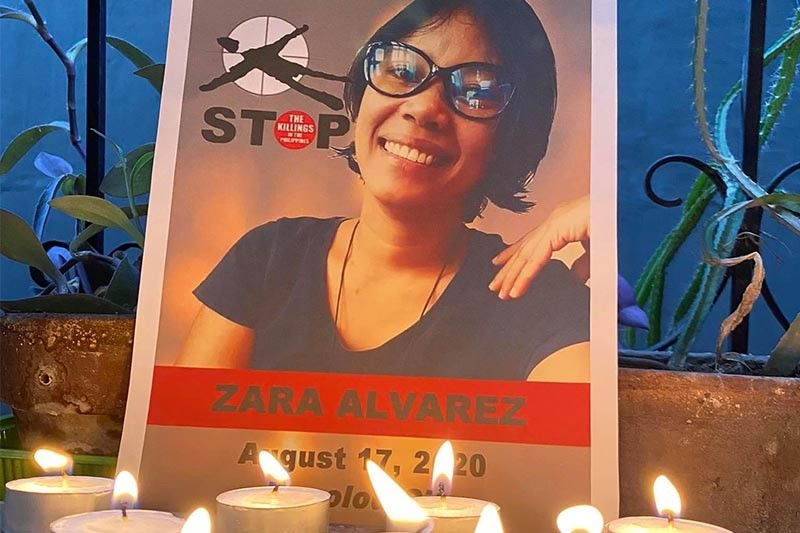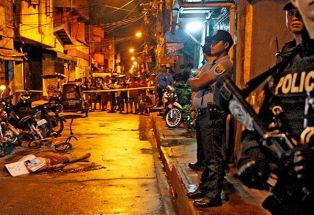Killing of Zara Alvarez highlights dangers of red-tagging — CHR

MANILA, Philippines — The killing of activist Zara Alvarez shows why red-tagging — labeling activists as rebels or enemies of the state — is a serious concern, the Commission on Human Rights, which has been cautioning against the practice, said.
Alvarez, gunned down Monday evening in Bacolod City, led campaigns against alleged human rights violations, was an advocacy officer of a community health program, and was a paralegal of watchdog Karapatan.
"The killing of Zara Alvarez is another addition to the alarming string of attacks against human rights workers and advocates in the country. The Commission on Human Rights sees this as a cause for concern, especially that the number of cases is still growing and justice is nowhere in sight," CHR spokesperson Jacqueline De Guia said in a statement Thursday.
Alvarez was reportedly included in the list of more than 600 people that the Department of Justice wanted legally declared as terrorists in 2018. De Guia noted that while her name was taken off the list, “the exclusion still did not spare her from the ultimate violation of her rights—succumbing to death after being shot.”
Peace consultants Randall Echanis and Randy Malayao—whose names were also included in the proscription petition—have since also been killed.
CHR said its regional office has already opened a motu proprio (on its own initative) investigation into the killing of Alvarez.
Dangers of red-tagging
In its report on the situation of rights defenders in the country released last month, the commission said that red-tagging of human rights defenders already constitutes a grave threat to their lives, liberty and security.
"Further, tagging human rights workers and advocates as terrorists distorts the nature of their work and makes them open, legitimate targets to attacks and a number of violations," De Guia said.
Karapatan earlier said that red-tagging by government forces is usually followed by threats through electronic or physical means, surveillance and harassment, arbitrary or illegal arrest and detention, or torture. In some cases, red-tagging also translates to enforced disappearances and even killings.
CHR reminded state officials that any call for them to fulfil their obligations should not be taken as a move to destabilize the government.
“But, even if the killing of Alvarez was not linked to her work, it does not erase the duty of the government to prevent arbitrary deprivation of life from happening, as well as keeping communities safe and free from attacks to human life and rights,” De Guia said.
Harmful rhetoric
As a response to Malacañang’s remark that blaming state forces behind activists’ killings is “unfounded,” Karapatan stressed that President Rodrigo Duterte and the National Task Force to End Local Communist Armed Conflict have "repeatedly ordered and incited violence" against them
“We consider any pronouncement by the president and his minions especially before the public inciting harm on and killing of activists and human rights defenders as direct orders for State forces. Any jeer, any post, any comment, any poster, any case should be considered as acts of complicity or inducement. Any unsolved case is an act of tolerance or acquiescence,” Kristina Palabay, Karapatan secretary general, said.
The CHR report said that the prevailing climate of impunity in the context of violence against rights workers is “largely attributable” to the statements of the chief executive.
“The president, through his pronouncements, created a dangerous fiction that it is legitimate to hunt down and commit atrocities against human rights defenders because they are enemies of the State,” the report read.
A report of the United Nations rights office released in June also said that vilification of dissent and attacks against perceived critics of the government are being “increasingly institutionalized and normalized in ways that will be very difficult to reverse.”
“Thus, blaming state forces as people behind these killings—these extrajudicial killings—are not only well-founded allegations. These are substantiated in the cases and complaints filed before the local courts and Supreme Court, the Commission on Human Rights, the joint mechanism of government with the National Democratic Front of the Philippines, and international human rights mechanisms,” Palabay said. — with report from Kristine Joy Patag
- Latest
- Trending


































